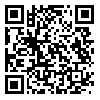BibTeX | RIS | EndNote | Medlars | ProCite | Reference Manager | RefWorks
Send citation to:
URL: http://jdisabilstud.org/article-1-2840-en.html
2- MA in Family Counseling, University of Science and Arts of Yazd, Yazd, Iran
3- MA in School Counseling, Shahid Chamran University of Ahvaz, Ahvaz, Iran
Abstract
Background & Objectives: Bullying poses a pervasive problem, disrupting one's learning process and leading to undesirable personality and social consequences. Adverse consequences of bullying include loneliness, low self–esteem, psychological problems, high suicidal ideation and suicide attempt in adulthood, problems in romantic relationships in adulthood–marriage, substance abuse, anxiety, carrying weapons, adjustment problems, poor relationships with peers, challenging friendships, personality disorders, antisocial behaviors, and reduced empathy. Bullying is one of the factors that, in the long run, can decrease empathy and social wellbeing in students. Meanwhile, people with high moral intelligence show more warmth and intimacy. They are kind to their friends and are more sensitive to their needs. Therefore, the present study was conducted to determine the effectiveness of teaching moral intelligence skills on empathy and social wellbeing of bullying students.
Methods: The method of the present study was quasi–experimental with a pretest–posttest design and a control group. The statistical population comprised all senior high school students in the 18th district of Tehran City, Iran, in the academic year 2021–2022. Two schools were selected from the boys' high schools in the region. Finally, 40 students who received the highest score in Olweus Bully/Victim Questionnaire–Revised (OBVQ–R) (Olweus, 2003) were selected and randomly assigned to the experimental group (20 students) and the control group (20 students). The inclusion criteria included not using other psychological and psychotherapeutic services while participating in the research, lacking psychiatric disorders, not taking psychiatric drugs, and not undertaking the advice of another group during the research. The exclusion criteria included dissatisfaction to participate in the study, absence from more than two training sessions, and inability to perform training sessions. The study data were collected using Basic Empathy Scale (Jolliffe & Farrington, 2006), Social Welfare Questionnaire (Keyes, 1998), and Olweus Bully/Victim Questionnaire–Revised (OBVQ–R) (Olweus, 2003). Experimental group participants received 11 sessions of moral intelligence skills training (Borba, 2001). However, no intervention was provided for the control group. The analysis of the data obtained from the research was done with the help of SPSS version 22 in two parts: descriptive statistics (mean and standard deviation) and inferential statistics (multivariate covariance analysis). The significance level of the tests was considered 0.05.
Results: The results showed that after removing the effect of the pretest, moral intelligence training was effective in increasing the empathy (p<0.001) and social wellbeing (p<0.001) of students. According to Eta squared, the increase in the mean scores of empathy and social wellbeing was 85% and 76%, respectively, after the intervention with moral intelligence training.
Conclusion: According to the results, moral intelligence skills training effectively increases the empathy and social wellbeing of bullying students. Therefore, it is recommended that school counselors use moral intelligence skills training to improve the empathy and social wellbeing of bullying students.
| Rights and permissions | |
 |
This work is licensed under a Creative Commons Attribution-NonCommercial 4.0 International License. |



